- Home
- P. T. Deutermann
Cold Frame [retail] Page 4
Cold Frame [retail] Read online
Page 4
If she’d been some middle-aged, ultraliberal bulldagger he wouldn’t have bothered, but she was somehow—memorable. He had never allowed himself to get into a relationship, much less marriage, with any of the professional women he’d met in the capital. In his view, relationships of any kind were to be carefully husbanded, and never established unless there was a clear prospect of benefit for his own career. That didn’t mean he didn’t keep a lookout for the possible exceptions, but after all his years in Washington watching other power players, and, in particular, watching too many truly dedicated people suffer through divorce or other marital distress, he’d decided to stay single. He’d met women over the years whom he had respected, admired, or even desired, but he felt that putting a woman in the mix was at best a distraction, and at worst a potential career liability.
Over time he’d begun to treat Ellen Whiting as if she was working directly for him as well as the Bureau, as sort of an apprentice protégée, and after a while, she’d responded. It wasn’t all that hard for him to win her confidence, being a senior White House advisor and a well-known power broker, but he’d been very careful to ensure that there was nothing romantic or sexual about it. She, on the other hand, was savvy enough to understand the value of being close to someone like him, especially when one of the other members of the DMX tried to pull bureaucratic seniority on her when she spoke for the Bureau. Beyond that, he’d thought that she might be useful one day if he ever had to go through with his very close-hold plans for weeding out the weak links at DMX. From the angry set of her jaw now, though, he realized he may have been wrong about that.
She came back to the table and sat down next to Mandeville and waited for him to say something. She was definitely angry, he concluded. But there was no way she could know.
“McGavin,” he said, finally. “What happened?”
“He died, that’s what happened.” Her fine lips were compressed into a tight line.
“You were there? You saw it?” he asked.
“Not exactly. We’d met, ordered some wine, and then I went to the powder room. When I came back out of the bathroom door, he was on the floor.”
“And then you got out?”
She nodded.
“Any fallout?” he asked.
She shook her head. “Not yet. But he was DHS, so…”
“They know the circumstances?”
“No,” she said. Monosyllabic answers. Shit, he thought. She’s really pissed off. He should have expected this, he thought. She was Bureau, but had never been an operator in the CT world.
“Local authorities?” he continued.
She shrugged. It made her close-cropped, glossy dark hair shimmer as it moved in the late-afternoon light. He suddenly wanted to touch it. Down, boy, he thought. This one’s too smart not to be dangerous. But it was also obvious that she was trying hard to control herself.
“Metro PD should treat it for exactly what it looks like,” she said.
“‘Should’?”
“The incident’s being handled by some low-level detectives in Metro PD’s Interagency Liaison Bureau.”
“What’s that?”
“A channel between Metro PD and all federal LE. If a problem has the slightest link to anything federal, their job is to shop it out of MPD. Not exactly their top drawer.”
“Can they make problems?”
“I doubt it,” she said, after a moment’s reflection. “Right now they’re treating it as just another middle-aged white male getting overexcited at the thought that he might score with somebody who looks like me.”
Mandeville forced a smile. “I can relate to that,” he said.
“Don’t,” she said, looking right at him. “Look what happens.”
He laughed out loud. She didn’t seem to be that amused.
“We need to talk,” she said.
“Oh, yes?”
She leaned forward, her eyes suddenly intense. “I think you set me up.”
He did not reply.
“God-dammit, Mandeville!” she exclaimed. “You asked me to cozy up to him, see if I could talk him out of this policy-review business. McGavin’s a known letch, you said, so show some leg, make him think that there were possibilities—your words, remember? You never said anything about killing him!”
“Killing him?” he said. “Calm down, Ellen. Consider the visuals: one assistant deputy under whatever-the-fuck keels over in a fancy restaurant—that’s not news. Too many butter-laced lunches with vodka back.”
“That’s not what I’m talking about,” she fumed. “I think you’ve just made me an accessory to a fucking murder!”
“What?” he asked. “Where the hell did murder come from? The guy died—he was overweight, mid-fifties, white—how is that murder?”
She glared at him. “It’s too neat, that’s how. You got me to play up to him, make him think we might get it on, I meet him in a restaurant, and he dies?”
“Just because you bought some flowers?” he said, his voice becoming smooth as silk.
Her eyes widened. “I don’t know what you did or how you did it, or what the fuck flowers had to do with it, but I did not sign up to kill someone just because he disagrees with what the DMX is all about. Are you fucking crazy?”
“Calm down, Ellen,” he said again. “Nobody’s talking murder except you. All you were supposed to do was lure him into a faintly compromising situation and then sweet-talk him into voting against a policy review. You agreed to do that. I don’t know what happened after that. I surely didn’t tell anyone to kill him. What happened—happened. I’m not glad that he died, but I’m not sad, either.”
“What?!”
He leaned forward. “Look,” he said. “You, more than anyone else, know what our problem is these days. You know who our traitors are.”
“Traitors? Dissent’s become treason now?”
“Goddamn right,” he said. “If I had my way, there’d be two more incidents just like that. The three stooges: McGavin, Logan, and Wheatley. Sitting here on the DMX and pretending to work with us, while all the time maneuvering backstage at the behest of their Senate masters to kill the DMX. Yes, two more prominent funerals would be just fine with me.”
“And how do I know you’re not behind what happened to McGavin? He had two sips of wine. I went to the ladies’ room. When I came back he was crashing to the floor.”
“Well, somebody better look at that wine, don’t you think?” he said.
“I had had an entire glass of that wine,” she said. “I didn’t flop and twitch. What the fuck did you do?”
“I didn’t do anything. But I’ll tell you this: if either Logan or Wheatley decide to stroke out in the middle of lunch in the near future, I’m going to make sure that everybody else on the DMX makes a connection, however bogus—fuck with DMX and bad things might happen.”
She sat back in her chair, staring at him, probably realizing now that he had in fact had the man killed. “I suspect they might manage that all on their own.”
“You think?”
“Of course they will,” she said. “And when they do figure it out, they will (a) take themselves off the committee, and (b) one of them will sit down with the Washington Post and raise the pregnant question.”
“And what’s the most plausible answer to that question?”
She stared at him for a moment.
He waited.
She wilted just a bit. “Someone on the Kill List.”
“Bingo,” he said. “Look: the people on this committee are the people who decide who goes on the Kill List. We’re the ones who send a name to the President. Surprise, surprise, one of the ‘nominees’ or his black-hearted heirs entertained thoughts of payback for that singular honor.”
“Seriously?”
“I’ve done nothing wrong, Ellen,” Mandeville said. “But I will take advantage of this situation. If I can, I’ll insinuate that McGavin’s sudden demise just might—might—be related to his underhanded machinations against DMX.
Washington runs on political paranoia. So: I’ll throw some straws into the wind. In plain English, back off the DMX or bad things can happen. Most importantly, their puppet masters in the Senate will also get the message.”
“No doubt,” she said. “But they’ll get the Bureau into it. Or the Secret Service. Hell, maybe both. What then?”
“Well, now, my dear coconspirator: that’s the good news. If one of them gets into it, they’ll all get into it—the Bureau, the Secret Service, the CIA, the DIA, the NSA, the DHS—I can go on for fucking ever, when you think about it. How many different federal security organs are currently grappling against global terrorism—fifty-eight? No, wait, I’ve got the digits right, but the order wrong, don’t I. It’s eighty-five, now that I think of it. Yes, eighty-five.”
“So what?”
“Don’t you see, Ellen? They’ll all get into it, like a pack of scrabbling dogs. And because of that, they’ll make a hash of it. Especially since McGavin’s sudden death had nothing to do with DMX.”
“You light that fuse?” she said. “You insinuate that McGavin died because he opposed DMX? Somebody will definitely come after you.”
“There’s nothing to find,” he protested.
“You can’t have it both ways,” she said. “You start a rumor that McGavin died because he messed with the DMX, somebody in all those eighty-five agencies will start looking really hard at you. You’re not known as a crusader for nothing.”
He sat back in his chair and gave her a cold smile. “Well, if that happens, you can count on the fact that I’ll have some meat ready to be thrown to the pack, won’t I, Ellen Whiting. Lunch date.”
“Meat?” she asked. “You mean me?”
“You were there, with McGavin,” he said. “You picked the wine. You bought the flowers.”
She just stared at him.
He held up his hands. “Let’s go back to basics, here, shall we? DMX is all about taking out crazed Muslims who’ve spent too much time in the sun and who are bent on our destruction. DMX is not about jailing them, or prosecuting them—but killing them. Killing. Them. Dead. And doing so in as dramatic a fashion as possible. Like those Somali natives with their eyes out on stalks told CNN: there was a fire in the sky, then a flash on the ground, and Abdullah’s car and everybody in it was just—gone. That’s what the List is all about, remember?”
“But what you’re saying equates legitimate dissent about DMX with the terrorists themselves.”
“Guilty,” he declared. “Because, in my opinion, there is no difference between an Al Qaeda boss ordering up an embassy bombing and some squishy liberal from the department of whatever trying to take down the one really effective weapon we have left against the terrorists: and that’s the Kill List. These three political appointees—appointees, mind you, not professionals—are the main proponents of cranking up an interagency review. I’ve been fighting a rearguard action for almost two years now against those three worms and their sponsors in the Senate. They are especially dangerous to us because they are sitting members of the DMX committee, which gives them even more credibility. Their backers in the Senate are fully aware of that.”
She put her hands up to her face, finally realizing what she was seeing.
He took a deep breath. “I am determined to purify this committee. I want no civil-liberty lawyers in this room. No doubters. No nonbelievers. People like that are contagious. What we do here ends in murder. Full stop. And, dear heart, all of us crossed that threshold a long time ago, when the first name to make the List vanished in a ball of fire.”
“But he was a foreigner. A known terrorist commander, bloody up to his armpits.”
“You’re quibbling,” he said. “Murder is murder. We vote a name onto the Kill List and he becomes proscribed—marked for death. Don’t know about you, but I sleep just fine at night when we do that, because we’re in a war with these people.”
“Okay, I want to hear you say it: McGavin—did you arrange for him to be killed?”
“Of course not,” he said. “But, like I said, I am going to take advantage of his sudden death to do some good work for Jesus. In my view, what we have here are some American bureaucrats who’ve joined forces with the enemy by trying to undo the DMX. Oh, I don’t mean literally joined the enemy, but I’m nothing if not a net-results man. These guys are helping some shaky old barnacles in the Senate, who’ve lost their nerve, to take away the only surviving U.S. government entity with the power to strike our worst enemies and: Kill. Them. Dead.”
“You really believe this, don’t you,” she said, softly. “That if someone starts to have doubts about the DMX and the Kill List, it would be convenient if they just—died? Is that what I hear you saying?”
“You never heard me say that, Ellen Whiting,” he said. “But it’s good to know you understand where I’m coming from. And just to amplify: I’d find a way to take down the entire committee if I thought that would preserve the Kill List. This town is nothing if not chock full of bureaucrats. I’m sure I could refill the DMX in about an hour.”
She blinked. Then he saw understanding wash over her face: what was it he’d called her? My dear coconspirator? “What if I just go warn the other two?” she asked.
“I’ll make sure your bosses in the Bureau know that you were there when McGavin suffered his unfortunate—accident.”
She opened her mouth to say something, but then closed it.
“Hey?” he said. “Let’s indulge in a little armed détente, why don’t we? This is Washington. Let’s make a deal. You agree to keep your mouth shut about my—um, sentiments. You forget I ever asked you to sweet-talk McGavin. You revert to simply being the Bureau’s rep on DMX. If you hear about any sort of serious investigation into McGavin’s sudden demise, you keep me informed. I, in turn, will keep my mouth shut about your role.”
She sat back in her chair.
“All right,” she said, suddenly calm. “A mutual lock, then.”
“Exactly,” he said, relieved. “The best kind. Now: I need to get back to my office. I believe we’re done here, aren’t we?”
* * *
When she had gone, Mandeville picked up the secure phone at the head of the table and called a number at FBI headquarters. He punched in four digits when the menu robot started up.
“Audiovisual support services,” a man’s voice answered. “Kyle Strang.”
“Call me back on a secure line.”
“We may have a problem,” Mandeville said once Strang called back and the sync tones subsided. “Whiting’s developed cold feet. Thinks I may have had something to do with the McGavin thing.”
“Perish the thought,” Strang said.
“Yes, really,” Mandeville said. “I denied everything of course, but now she’s very suspicious. I’ve talked her out of doing anything. Told her to go back to simply doing her day job on the DMX.”
“Then there’s no problem,” Strang said.
“You’re probably right, now that I think about it,” Mandeville said. “Plus, there is a bright side. At some point, we might need a patsy.”
There was a long moment of silence on the phone. “You mean if somebody outside of DMX starts looking into the, um, coincidences?” Strang said.
“Yes, exactly.”
“Like?”
“Some office in Metro PD called ILB.”
“Lemme pull the string on that,” Strang said. “I’ll get back to you.”
An hour later Strang called back. “Metro PD sent McGavin’s body to MedStar, who sent it along to OCME,” he reported. “My sources tell me that OCME pathologists are holding both the cause and the manner of death open.”
“Why do we care?”
“Cause of death should be damned near impossible to determine, but manner of death might turn out to be more important.”
“I’m confused.”
“Manner of death: natural, accidental, physiological incident, suicide, or homicide.”
“Oh,” Mandeville said. He thou
ght for a moment. “Okay,” he said. “Who’s involved at MPD?”
“Like you said, Metro PD has an office called the ILB—they’re—”
“Yes, Whiting told me. So?”
“One of their detectives has taken an interest.”
“Again, why should we care? As I understand it, in the great scheme of things, ILB is nobody-minus.”
“OCME’s pushing for disposition instructions. This ILB detective told them to wait. Apparently he’s on the hunt for the mysterious girlfriend who disappeared right after McGavin checked out.”
“Does he have her name?”
“Apparently he does.”
“Ah,” Mandeville said. “That we do not need.”
“Want to calibrate him?”
“Gently,” Mandeville said. “Find a way to let him know that he’s playing above his pay grade. If he’s any sort of cop at all he’ll get the message, but do keep it subtle. For now.”
“I know some people who can do subtle,” Strang said. “I think.”
“Get me his name and where he lives,” Mandeville said, and then hung up.
He sat back to think, as the Washington workweek began to dissolve into intractable traffic outside the EEOB. He could hear office doors down the cavernous marble-floored hallways closing and the sounds of staffers trying not to break into an unseemly trot down the halls in search of the weekend.
A Metro cop. A nobody. On the scale of important things in Washington, the Metro Police Department was somewhere down in the weeds. The distance between the National Security Council and the MPD was measured in light-years.
And yet: a presidency had been brought down by some drone leaving a door wedged open with a piece of paper, which had been discovered by—wait for it: a building security rent-a-cop at the Watergate. For want of a nail …
Strang would have someone lean gently, for a start, anyway, on the cop. The cop would go tell his boss, the one in the office who could both read and write, and he would tell the cop: watchit. But: was that enough?

 The Nugget
The Nugget The Hooligans
The Hooligans SPIDER MOUNTAIN
SPIDER MOUNTAIN![Cold Frame [retail] Read online](http://i1.bookreadfree.com/i/03/19/cold_frame_retail_preview.jpg) Cold Frame [retail]
Cold Frame [retail] Sweepers
Sweepers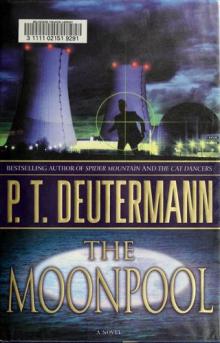 Cam - 03 - The Moonpool
Cam - 03 - The Moonpool Trial by Fire
Trial by Fire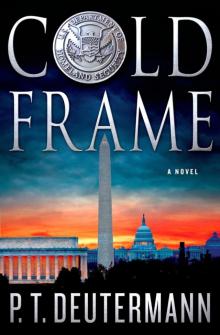 Cold Frame
Cold Frame Darkside
Darkside Cam - 04 - Nightwalkers
Cam - 04 - Nightwalkers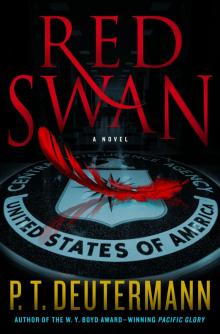 Red Swan
Red Swan The Commodore
The Commodore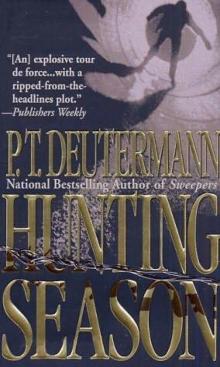 Hunting Season
Hunting Season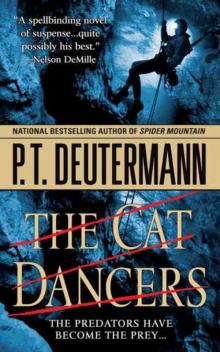 The Cat Dancers
The Cat Dancers Scorpion in the Sea
Scorpion in the Sea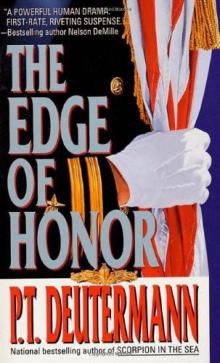 The Edge of Honor
The Edge of Honor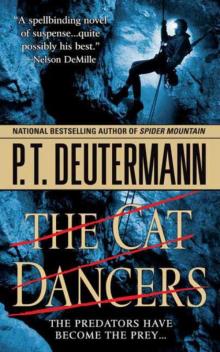 The Cat Dancers cr-1
The Cat Dancers cr-1 The Iceman
The Iceman The Iceman_A Novel
The Iceman_A Novel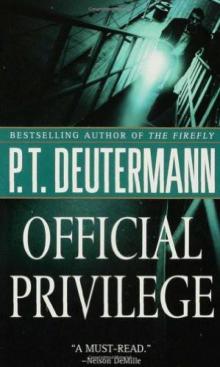 Official Privilege
Official Privilege Sentinels of Fire
Sentinels of Fire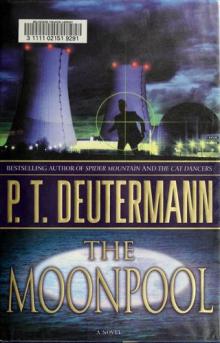 The Moonpool cr-3
The Moonpool cr-3 Nightwalkers cr-4
Nightwalkers cr-4 The Firefly
The Firefly Spider mountain cr-2
Spider mountain cr-2 Pacific Glory
Pacific Glory The Last Man
The Last Man